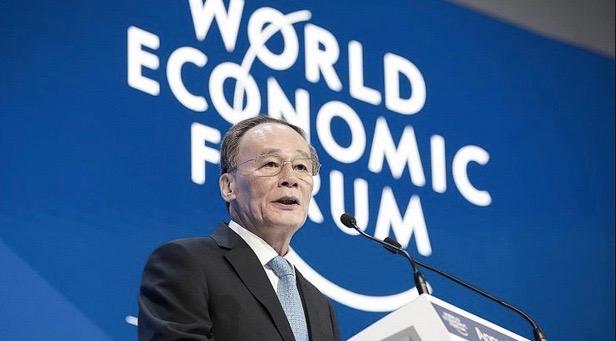During his run as premier under President Jiang Zemin, Zhu Rongji – a former Shanghai mayor -was the object of respect from Western leaders and was one reason they regarded China’s rise as a sustainable economic and geopolitical force with which they would have to work, like it or not. He had force of intellect, semi-ready pragmatism, and a command over the relevant mainland bureaucracies that were relied on to deliver on understandings with Washington. But since stepping down, 16 years ago, a missing element of sorts at the highest level of Chinese leadership seems to have surfaced. It is an unrealized factor in the recent downturn in the China-U.S. relationship.
Western observers, myself included, perhaps focus too intensely on aspects of leadership personality in analyzing a nation’s international relations. Singapore’s late, great Lee Kuan Yew once took me to (mild) task for “the Western journalist’s exaggeration of eccentricity” in my writings about him. Fair enough. Yet Lee’s gargantuan political personality in Lilliputian Singapore served to elevate his country to a sort of Sweden-Plus. What’s more, and for good reason, leaders themselves will always seek to take the measure of their counterparts before an important meeting or summit, going through page after page their intelligence services’ psychological reports. No, sorry – political personality counts, and it can count for a great deal.
And so it may be that the perceived political-personality vacuum at China’s top is now being filled by another former Chinese mayor – this one from Beijing, rather than Shanghai. Perhaps Mr Wang Qishan will never become a well-known known figure in America, or if he ever is, his identity will be framed as little more than a dreaded top Communist Party official – and that will be that. But China’s current vice president and right-hand man to President Xi Jinping seems seamless with the same pragmatic cloth as Zhu. If America – in this or in the next Presidential administration – cannot deal maturely with the Wangs and Zhus of China, then it is going to have serious problems adjusting to the 21st century and finding into a more fitting place to settle.
Mr Wang made his first notable American stage appearance in 2005, in Los Angeles, before a civic group. His message was international and seemed as far removed from primeval Red Guard ideology as almost anyone communist could be. The audience of American businessmen and academics was immensely reassured. That approach was also evident last week in Davos, where Mr Wang was the headliner dispatched from Beijing to put the best possible face on Xi’s China. Now, we acknowledge that Davos isn’t what it used to be; but outside of – oh – world-famous museums and vintage wines – few things are. Fifteen to twenty years ago the World Economic Forum was to the notion of ‘globalization’ what an advertising agency is to the big client: a big glossy front. When Bill Clinton in January 2000, politely, raised the Davos party-deflating demurer that globalization also had the power to create dark dimensions as well as new profits, in the first speech at the World Economic Forum ever by a sitting U.S. president, I can still recall sharkskin-suited American and European CEOs muttering:’ What does he want us to do about it? Our job is to make money. We’re not socialists… etc.’
Wang’s Davos address was almost neo-capitalistic, especially for a committed career communist, and it made considerable sense. Move forward but understand the need to bring as many people along with you as possible; even China (it seemed he was saying) has domestic political winds in constant swirl: “By striving to meet people’s aspiration for a better life, we can surely win their support.” Dogmatism won’t do the trick: “We have moved way from revolution to reform, from a planned economy to a market economy …. We have broken free from the fetters of dogma and Utopian thinking, freed out minds and taken a realistic and pragmatic approach, and applied Marxism’s basic tenets in the context of China’s realities.” That sounds like the old Zhu to me – as well as Wang in 2005 through the present.
It’s true that China’s Vice President, who at 70 is well past the official ‘mandatory’ retirement age, won’t be forever seated next to President Xi, now 65 (and with length of incumbency Constitutionally unlimited). The America-impressing Zhu, now in retirement at 92, held the job until he was 75, which seems achievable for Wang, should he continue to desire to remain so high up on a perch in plain sight of so many in China who are bitter – the wails coming from the relatives of Chinese prisoners, where legions nailed by Wang’s anti-corruption sweeps continue to age rapidly.
It would much easier for me – an American – to feel righteous about criticizing China’s massive repressive style if for our own part we had not had so locked up in our prisons so many black Americans or – so recently – brutally separated apparently countless children from parents caught illegally on American soil to store in dreary camps. You can look down at others from your high horse, but it is harder to see yourself clearly with a downward focus.
And so, in the wild of the animal world, we learn that male lemurs (otherwise rather cute) engage in a form of combat that the wonderful English author and scholar Katherine Rundell described in a London book review as (and I quote) “stink fighting” (I will spare you the details), adding “… all the while maintaining an aggressive stare until one or the other animal retreats.” Surely Beijing and Washington can rise above the lemur level, right? Yet Rundell did add of the lemur male behavior: “It feels no madder than current forms of diplomacy.”
Columnist Tom Plate, the author of Conversations with Lee Kuan Yew, is the distinguished scholar of Asian and Pacific Studies, at Loyola Marymount University in Los Angeles.

